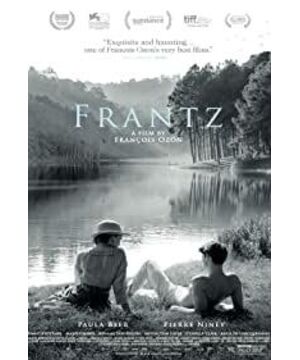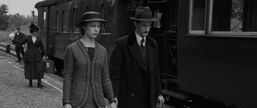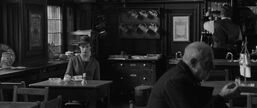do you know? Anna, I've been trying to kill myself since I came back from Germany.
Me too.
Everything in the world is too painful, and I really don't want to bear it any longer.
But...that kind of behavior is selfish and one cannot live for oneself only.
The film tells the story of the protagonist Anna who lost her fiancé in the German-French War and met her "friend" Adrian, who came from France to pay homage. The scene of the story takes place in Germany in the first half and in France in the second half. People also sing "Guardian of the Laine" and "Marseilles", which highlights the film's thinking about war.
The relationship between groups and individuals in the film is first manifested in the treatment of the male and female protagonists when they are in foreign countries. The nation brings people a strong sense of belonging and moral responsibility. The guests of the enemy country were cast aside at will, and the dignity and emotion of the individual were blatantly ravaged and trampled on. When one is in a group without thinking, the moral sense of the individual is lost.
The meeting of Adrian and Anna means that the individual comes out of the collective. When we no longer meet each other directly with a certain label, a certain identity, morality and respect can be re-emerged. When Adrian appeared in front of Anna and Franz's mother as Franz's "friend", warmth and concern replaced national hatred. Franz's father, who was originally hostile to Adrian, also changed his attitude because of this strange Frenchman's concern for his son. Even when he was despised by his fellow citizens for his association with the French, the father made a deafening reflection: "We sent them to the front, and when we killed the enemy's son, we are here to toast us. victory, and when they killed our son, they were also toasting their victory."
When Adrian confessed the truth, we learned that the whole story of this story stemmed from the few seconds of staring between a French soldier and a German soldier in a narrow trench, when they no longer regarded German soldiers or French soldiers. The identities of soldiers met, but only when two people stood face to face, the benevolent one fell to the ground. Adrian could certainly be a hero under the umbrella of nationalism, but Franz's stare couldn't be erased from his mind. The sense of responsibility for the "other" fills his heart with guilt and self-blame, so he hopes to be forgiven by Franz's parents and fiancee.
Adrian's arrival comforted Franz's parents and fiancee, but Adrian could not replace Franz's position after all, because Adrian also had his own family and his fiancee. Can we get rid of the responsibility of the other? Can we not live in the Other? Before leaving Paris, Anna also lived in the fetters of her deceased fiance and her fiance's parents. When Anna sat in the Louvre to admire Manet's oil painting "Suicide", she had already received a kiss from Adrian after all.
View more about Frantz reviews











